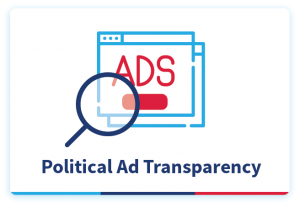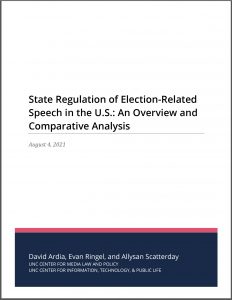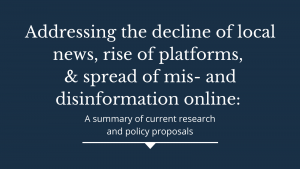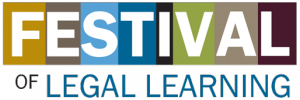 In partnership with the UNC Center for Information, Technology, and Public Life (CITAP), the Center for Media Law and Policy has been researching and summarizing state laws that impose disclosure and/or recordkeeping requirements on online platforms that carry digital political advertisements.
In partnership with the UNC Center for Information, Technology, and Public Life (CITAP), the Center for Media Law and Policy has been researching and summarizing state laws that impose disclosure and/or recordkeeping requirements on online platforms that carry digital political advertisements.
Digital political ads have become an increasingly important tool for political candidates and committees, yet existing federal laws governing political advertisements focus primarily on traditional mediums of communication. While the Federal Election Commission has detailed sponsorship disclosure requirements for political advertising on television and radio, the agency currently does not regulate online political advertising in the same way. Congress proposed legislation in 2017, 2019, and 2021 to extend existing disclosure requirements for political advertisements to online political advertisements, but no action has been taken on these bills.
To fill this regulatory gap, a handful of states have enacted new legislation or amended their existing election laws to increase transparency by imposing sponsorship disclosure and/or recordkeeping requirements for online political advertisements. As of 2020, six states had enacted such laws, which we analyzed in a report written by Ashley Fox and Dr. Tori Ekstrand, “Regulating the Political Wild West: State Efforts to Disclose Sources of Online Political Advertising,” and summarized on the CITAP Digital Politics website under the section on State Disclosure and Recordkeeping Requirements for Digital Political Ads.
Since 2020, three additional states, Alaska, Colorado, and Virginia, have enacted their own laws requiring sponsorship disclosure for online political ads. We’ve updated the CITAP Digital Politics pages to include summaries of the new laws, which you can read here.
The Highlights:
Virginia’s regulations are the most comprehensive, with disclosure requirements varying based on the type of ad and who paid for it. Rather than creating new disclosure requirements specifically for online political ads, Virginia’s law instead subjects different types of online ads to its existing requirements for print, broadcast, and radio ads. For the purposes of disclosure requirements, online graphic advertisements with no video or audio components are treated like print ads; online video advertisements are treated like broadcast ads; and online audio-only advertisements are treated like radio ads.
The Virginia law, however, does not impose liability on online platforms for any political ads that fail to include the required disclosures. The law also requires individuals and organizations that purchase or promote an online political ad to tell the platform they are political advertisers and certify that they are permitted under state and local laws to purchase or promote online political ads.
In contrast, Colorado and Alaska’s laws create new disclosure requirements for online political ads. While Alaska’s law has different requirements based on whether an online political ad has print, video, or audio components, Colorado’s law has one set of disclosure requirements for all online political ads, regardless of the content type.
You can read more about the specifics of each state’s recordkeeping and disclosure requirements on the CITAP Digital Politics site here.
–Noelle Wilson, CITAP Media Law Fellow




 One of the biggest annual events at the UNC School of Law is the
One of the biggest annual events at the UNC School of Law is the